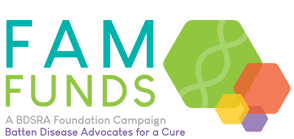“Intracerebroventricular cerliponase alpha (BMN 190) in children with CLN2 disease: Results from a Phase 1/2, open-label, dose-escalation study (A. Schulz et al)
The following is reported with our thanks to the BDFA:
87% of children on the trial experienced a slowing down of the progression of the disease.
This means that based on the CLN2 rating scale (measuring mobility and language with a normal score being 3 for each) we would expect children to lose 2 points over 48 weeks, the children on the trial lost 0.43 points on average.
The MRI results for the trial also showed that brain volume loss was less in the children on trial compared with the natural disease progression.
The drug, cerliponase alpha, is administered to children through a port directly in the brain in a 4 hour infusion every two weeks. The data released show that the process was generally safe and well tolerated by the children.
When the data was further examined for the 9 children who have entered the extension part of the trial they suggested that the benefits have continued with children showing an improvement of 0.2 points at 72 weeks compare to an expected loss of 3.13 points.
Of those 9 children 3 have gained a point, 5 have remained stable and 1 has lost a point.
4 children have now been receiving the drug for 88 weeks and the data has shown a loss of 0.5 points compared to expected loss of around 3.83 points.
BioMarin plans to submit applications for the licensing of this drug to the regulatory authorities in Europe and the USA in the middle of 2016 and there is the hope that they will receive the official responses in the first half of 2017.
BioMarin’s statement on compassionate use of Cerliponase Alpha is as follows:
“BioMarin is planning to implement an early access program to provide access to treatment for additional CLN2 patients prior to obtaining marketing approval. An early access program will be limited in scope and number of participants, and will be conducted under a protocol. We expect that the program will be conducted at centers that have participated in the cerliponase alfa study. Those sites have experience administering this drug directly to the brain and would ensure continued patient monitoring. The program is expected to begin in Q3 2016. The exact timing will vary by country of the sites participating. The overall scope, eligibility criteria and details of this program are still being determined. BioMarin must adhere to specific legal procedures for each country and has begun these preparations at risk with the goal of being ready to dose patients in Q3 2016. BioMarin will provide additional details about the scope and timing of this program as they become available.”
To read the full BioMarin announcement click here


